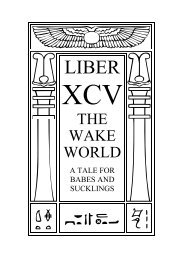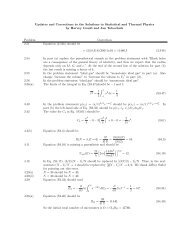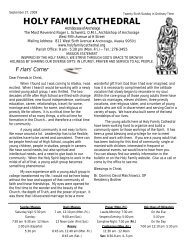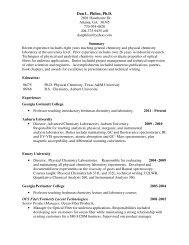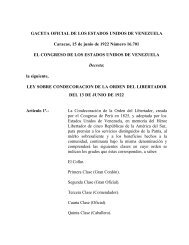Usually at this time of year we have - WebRing
Usually at this time of year we have - WebRing
Usually at this time of year we have - WebRing
You also want an ePaper? Increase the reach of your titles
YUMPU automatically turns print PDFs into web optimized ePapers that Google loves.
<strong>Usually</strong> <strong>at</strong> <strong>this</strong> <strong>time</strong> <strong>of</strong> <strong>year</strong> <strong>we</strong> <strong>have</strong> our final Letter for the <strong>year</strong> and it has something to<br />
do with Christmas, but <strong>this</strong> <strong>year</strong> I decided to put a little twist in and <strong>we</strong> are going to<br />
celebr<strong>at</strong>e New Year. As New Year is in the middle <strong>of</strong> our summer break <strong>we</strong> don‟t do<br />
many activities about New Year.<br />
Below is a Poem about the end <strong>of</strong> the <strong>year</strong>. It is follo<strong>we</strong>d by a list <strong>of</strong> ways th<strong>at</strong> different<br />
cultures, faiths or countries <strong>have</strong> or still do celebr<strong>at</strong>e the start <strong>of</strong> a New Year.<br />
The Year<br />
by Ella Wheeler Wilcox<br />
Wh<strong>at</strong> can be said in New Year rhymes,<br />
Th<strong>at</strong>'s not been said a thousand <strong>time</strong>s?<br />
The new <strong>year</strong>s come, the old <strong>year</strong>s go,<br />
We know <strong>we</strong> dream, <strong>we</strong> dream <strong>we</strong> know.<br />
We rise up laughing with the light,<br />
We lie down <strong>we</strong>eping with the night.<br />
We hug the world until it stings,<br />
We curse it then and sigh for wings.<br />
We live, <strong>we</strong> love, <strong>we</strong> woo, <strong>we</strong> <strong>we</strong>d,<br />
We wre<strong>at</strong>he our brides, <strong>we</strong> sheet our dead.<br />
We laugh, <strong>we</strong> <strong>we</strong>ep, <strong>we</strong> hope, <strong>we</strong> fear,<br />
And th<strong>at</strong>'s the burden <strong>of</strong> the <strong>year</strong>.<br />
1) Baby New Year Tradition<br />
The tradition <strong>of</strong> using a baby to signify the New Year was started around 600 B.C by the<br />
ancient Greeks, who, <strong>at</strong> the start <strong>of</strong> a <strong>year</strong> would carry a baby around in a basket. The<br />
purpose <strong>of</strong> it was to honor Dionysus, the God <strong>of</strong> Fertility and symbolize his annual rebirth.<br />
2) Hogmanay<br />
The New Year in Scotland is called Hogmanay. The people in Scotland follow a ritual th<strong>at</strong><br />
appears nutty but actually has a gre<strong>at</strong> significance. One can find barrels <strong>of</strong> tar set afire<br />
and gradually rolled down the streets in the villages <strong>of</strong> Scotland. This ritual symbolizes<br />
th<strong>at</strong> the old <strong>year</strong> is burned up and New Year is going to begin.<br />
3) Burning "Mr. Old Year"<br />
In Columbia, Cuba and Puerto Rico families stuff a life-size male doll with things and then<br />
they dress it up in old clothes from each family member. At the stroke <strong>of</strong> midnight, <strong>this</strong> 'Mr.<br />
Old Year' is set on fire. This is done with the simple belief th<strong>at</strong> a doll thus stuffed <strong>have</strong> bad<br />
memories or sadness associ<strong>at</strong>ed with them, and th<strong>at</strong> the burning <strong>of</strong> these will help one<br />
to do away with all past grief's and usher in happiness in life with the coming <strong>year</strong>.<br />
4) E<strong>at</strong>ing Noodles<br />
L<strong>at</strong>e on the evening <strong>of</strong> December 3 1, people <strong>of</strong> Japan would e<strong>at</strong> a bowl <strong>of</strong> buckwhe<strong>at</strong><br />
noodles called "toshikoshisoba" ("<strong>year</strong>-crossing noodles") and listen for the sound <strong>of</strong> the<br />
Buddhist temple bells, which <strong>we</strong>re rung 108 <strong>time</strong>s <strong>at</strong> midnight. The sound <strong>of</strong> these bells is<br />
said to purify the listeners <strong>of</strong> the 108 sins or evil passions th<strong>at</strong> plague every human being.<br />
5) E<strong>at</strong>ing 12 Grapes<br />
In Spain people e<strong>at</strong> 12 grapes as the clock strikes midnight (one each <strong>time</strong> the clock<br />
chimes) on New Year's Eve. This peculiar ritual origin<strong>at</strong>ed in the t<strong>we</strong>ntieth century when



